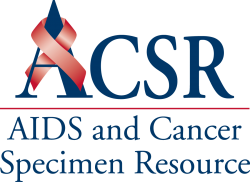National Cancer Institute (NCI)
The National Cancer Institute (NCI) is a component of the National Institutes of Health and the Federal Government’s principle agency for cancer research and training. The NCI coordinates the National Cancer Program, which conducts and supports research, training, health information dissemination, and other programs with respect to the cause, diagnosis, prevention, and treatment of cancer, rehabilitation from cancer, and the continuing care of cancer patients and their families.
The NCI Office of HIV and AIDS Malignancy (OHAM)
The National Cancer Institute (NCI) established the Office of HIV and AIDS Malignancy (OHAM) in December 2007 to enhance its research effort in the field of HIV/AIDS and HIV malignancies. OHAM includes two Programs:
The AIDS Cancer Clinical Program (ACCP)– Led by Dr. Mostafa Nokta, the ACCP has the primary responsibility for overseeing clinical programs in OHAM including the AIDS Malignancy Consortium (AMC) and the AIDS and Cancer Specimen Resource (ACSR).
The AIDS Malignancy Program (AMC)–Led by Dr. Geraldina Dominguez, the AIDS Malignancy Program (AMP) has the primary responsibility for identifying new initiatives, for international activities, such as the initiative to Strengthen Capacity for HIV-Associate Malignancy Research in Africa, and for overseeing programs that the NCI co-manages with other Institutes, such as the Centers for AIDS Research (CFARs), the Multicenter AIDS Cohort Study (MACS), and the Women’s Interagency HIV Study.
The AIDS Malignancy Consortium (AMC)
This is a National Cancer Institute-supported clinical trials group founded in 1995 to support innovative trials for AIDS-associated malignancies. The AMC is composed of 14 main Clinical Trials Sites and their affiliates, and an Operations and Statistical Center. The AMC is committed to enhancing therapeutic options for patients with AIDS-associated malignancies.
The NCI Clinical Trials Cooperative Group Program
Sponsored by the National Cancer Institute (NCI), is designed to promote and support clinical trials (research studies) of new cancer treatments, explore methods of cancer prevention and early detection, and study quality-of-life issues and rehabilitation during and after treatment. Cooperative groups include researchers, cancer centers, and community physicians throughout the United States, Canada, and Europe. They work with NCI to identify important questions in cancer research and to design clinical trials to answer these questions.
NCI Best Practices for Biospecimen Resources
The National Cancer Institute (NCI) developed the NCI Best Practices for Biospecimen Resources (NCI Best Practices) based on extensive research and expert input into the state of NCI-funded biospecimen resources and the quality of biospecimens used in cancer research. The NCI Best Practices outline the operational, technical, ethical, legal and policy best practices for NCI-supported biospecimen resources.
The NCI Cooperative Human Tissue Network (CHTN)
Provides normal, malignant, benign, and diseased biospecimens to the scientific community for basic and developmental studies in many areas of cancer research. Specific questions about the CHTN may be directed to kradin@chtn.org or call (317) 620-1026.
The NCI Specimen Resource Locator
A database that helps researchers locate specimens for research. The database includes resources such as tissue banks and tissue procurement systems with access to normal, benign, pre-cancerous and/or cancerous human tissue covering a wide variety of organ sites. Researchers specify the types of specimens, number of cases, preservation methods and associated data they require. The Locator will search the database and return a list of tissue resources most likely to meet the requirements. When no match is obtained, the researcher is referred to the NCI Tissue Expediter. The tissue expediter is a scientist with contacts in the resources community who can rapidly relate investigator needs to appropriate resources. To contact the NIC Tissue Expediter, email tissexp@mail.nih.gov or call (301) 496-7147
Centers for AIDS Research (CFAR)
This program at the National Institutes of Health provides administrative and shared research support to synergistically enhance and coordinate high quality AIDS research projects. CFARs accomplish this through core facilities that provide expertise, resources, and services not otherwise readily obtained through more traditional funding mechanisms. The 20 CFARs located at academic and research institutions throughout the U.S. emphasize the importance of interdisciplinary collaboration, especially between basic and clinical investigators, translational research in which findings from the laboratory are brought to the clinic and vice versa, and an emphasis upon inclusion of minorities and inclusion of prevention and behavioral change research.
BioLINCC- NHLBI Clinical Database Repository and Specimen Collection Biorepository
The National Heart, Lung and Blood Institute (NHLBI) Biologic Specimen and Data Repository is the coming together of two entities: the NHLBI Biologic Specimen Repository (NHLBI Biorepository), managed by the NHLBI, Division of Blood Diseases and Resources (DBDR), Transfusion Medicine and Cellular Therapeutics Branch, and the NHLBI Data Repository, managed by the NHLBI, Division of Prevention and Population Sciences (DPPS), Epidemiology Branch. These two programs have always had a similar mission, namely to enhance and facilitate further research in cardiovascular, pulmonary and hematologic conditions by providing access to qualified investigators to stored biospecimen and data collections. The mission of BioLINCC is to facilitate access to, and maximize the scientific value of, the Biorepository and Data Repository and promote the availability and use of other NHLBI funded population-based biospecimen and data resources.
